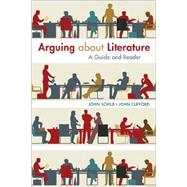PACKAGE THIS TITLE WITH OUR 2016 MLA SUPPLEMENT, Documenting Sources in MLA Style (package ISBN-13: 9781319084516). Get the most recent updates on MLA citation in a convenient, 40-page resource based on The MLA Handbook, 8th Edition, with plenty of models. Browse our catalog or contact your representative for a full listing of updated titles and packages, or to request a custom ISBN.
More and more, first- year writing courses foreground skills of critical analysis and argumentation. In response, Arguing about Literature hones students’ analytical skills through instruction in close critical reading of texts, showing them how to turn their reading into well-supported and rhetorically effective argumentative writing. Two books in one, it combines a guide to reading literature and writing arguments with a compact thematic anthology of stories, poems, plays, essays, and arguments for analysis and research, from the authors of Making Literature Matter.








